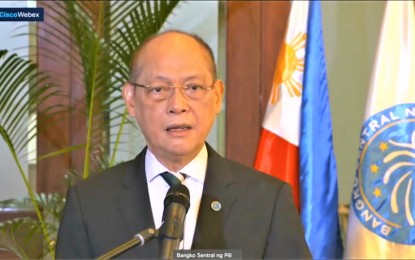
Bangko Sentral ng Pilipinas Governor Benjamin Diokno (File photo)
MANILA – Bangko Sentral ng Pilipinas (BSP) Governor Benjamin Diokno is confident that the Philippines will not lose its investment grade credit ratings amidst the jump in its debt because the level of liabilities remains within the international threshold.
He said while the debt to gross domestic product (GDP) ratio has risen to 54.6 percent as of end-2020, it remains below the 60 percent threshold “and we’re very careful about that.”
Diokno also noted that the Philippines’ debt-to-GDP ratio is better compared to some Asian countries.
“And the analysis is that because of the reforms that we have done our borrowing program is sustainable. So, there should be no fear that the rating agencies will downgrade us. In fact, in the sea of downgrades they have affirmed their ratings on the Philippines’ international credit,” he said.
As of end-2020, the country’s total external liabilities reached USD98.5 billion, higher than USD83.6 billion in end-2019.
This level of foreign debt accounts for around 27.2 percent of the country’s output.
Authorities point increase in foreign debt to funding requirements for government programs to address the impact of the coronavirus disease (Covid-19) pandemic as well as general financing requirements.
Diokno said debt service ratio (DSR), or the measure of the adequacy of the country’s foreign exchange earnings to meeting maturing foreign debts, is at 6.3 percent.
Philippines gross international reserves (GIR) amounted to USD107.25 billion as of end-April 2021, near its record-high USD110.117 billion in December 2020. It is equivalent to 12.3 months’ worth of imports of goods and payments of services and primary income.
Diokno said part of the reasons behind the sustainability of foreign debt is the conduct of annual survey on foreign borrowings of both the public and the private sector, the liberalization of foreign exchange regulatory framework, and the implementation of the law on the approval of public sector foreign borrowings. (PNA)
